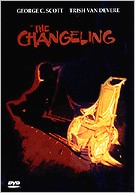|
|
|
THE CHANGELING
CAST:
GEORGE C. SCOTT - JOHN RUSSELL
TRISH VAN DEVERE - CLAIRE NORMAN
MELVYN DOUGLAS - SENATOR JOSEPH CARMICHAEL
A "changeling" is defined as a secret switch of one child for another. And the chilling 1980 horror film directed by Peter Medak tells the story of a murder of a six-year old crippled boy. The boy was secretly drowned in the attic bathtub, buried in a well, and then the father claimed the boy was sent to Switzerland for 13 years of therapy and miraculously was healed. A boy does return to the United States after World War I, at age 18, as "Joseph Patrick Carmichael."
After the death of the boy's mother, Emily Spencer in 1906, the real Joseph Patrick Carmichael, was named as the main beneficiary to the Spencer estate, but not until the age of 21, during which time his father, Richard, who was initially unnamed in the will, would be appointed the boy's guardian and would hold legal power of attorney. But, Joseph developed a crippling disease, and would not live to adulthood. Richard knew that upon Joseph's death, he, too, would lose control of the family fortune. His plan to murder for profit succeeded. The boy's body was buried and the secret was concealed for almost 80 years. His European replacement was an orphan from THE SACRED HEART ORPHANAGE from Switzerland. Their secret remain hidden, until a famous music composer arrived in 1979 to take up residence in the Carmichael mansion during his sabbatical.
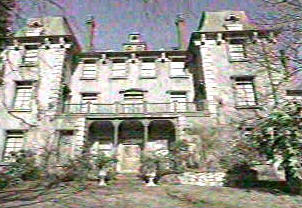
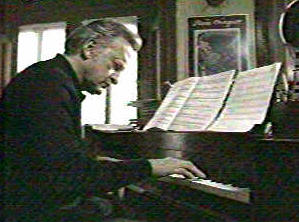
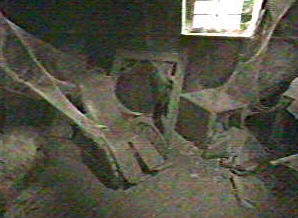
Four months following the accidental freak deaths of his wife and daughter, who were run over by a snow plow, classical music composer, John Russell, moves west from New York City to Seattle to accept a teaching post at the university. Upon referral from a teaching colleague, he is introduced to Claire Norman of the Historical Society and then rents out a century old Gothic style mansion that has not been inhabited for years, but kept in good condition by generous funds from state senator and former owner and resident, Joseph Carmichael, and now run by the Historical Society. But shortly after John moves in, some unusual and unexplained but repetitive occurrences in the house, including deafening loud banging on pipes and running tap water, draw his attention towards examining the files of the house at the Historical Society. He learns from the librarian that the house is "haunted". While examining the exterior of the house, some debris and pellets fly out from the closed attic window and land at his feet. John runs inside and discovers a hidden staircase behind the wall of a pantry, that leads up to the attic of the home, where he finds, amongst the cobweb covered furnishings, a child's wheelchair, a wind-up music box (which still works!) and concludes that there must be a spirit in the house which is calling out to him. More weird happenings, including a bouncing ball that comes down the staircase twice, and seeing the face of a drowned boy in the water, propel John to seek a medium to perform a seance in the home. She is able to reach the spirit. The name "Joseph Carmichael" is fiercly drawn onto a notepad with faint whispers of the spirit being recorded onto tape that is later amplified to reveal the name, again, "Joseph Carmichael".
| Through an investigation of various Carmichael property holdings, John checks out a home which was built over top a well and is horrified to find the remains of the six-year old body of Joseph Carmichael at the bottom of the well. A necklace with a gold medal, engraved with Joseph's name also finds its way to the composer-turned-detective. John pays an unwelcomed visit to Senator Carmichael and gives him the City records, the necklace, and tells him that he *knows* the truth. He saw the truth. The real Joseph Carmichael was murdered and the senator assumed his identity and inherited the Spencer fortune. The Senator angrily denies everything and is ready to pay him off as a blackmail threat, but later he, too, sees the truth while looking at a handpainted portrait of his father. His soul becomes drawn towards the home, which is now up in flames. As John flees the burning home, he sees the Senator walking in a trance up into the attic. John and Claire narrowly escape the burning house just in time before the attic explodes and the entire house is scorched. They arrive at the Senator's mansion to see his body being taken away by an ambulance. Senator Carmichael had suffered a fatal heart attack. The soul of Joseph Patrick Carmichael is now at peace. |
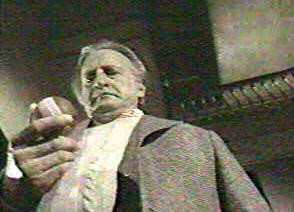 |
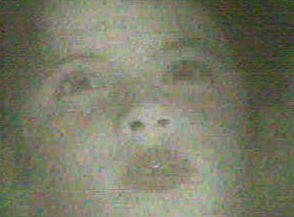
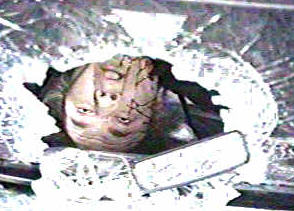
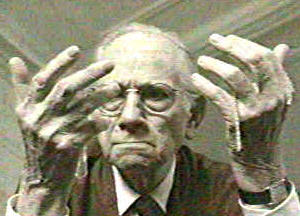
The 1980 film was released onto DVD by HBO with enhanced widescreen transfer at 1.77:1 and letterboxed. Running time is 115 minutes with subtitles in English, Spanish and French. There are no "extras", not even a movie trailer. Extensive cast and crew biographies are presented, but these do not consistute as "extras". Image has some graininess but overall is quite sharp and well defined. Audio is an English Dolby Digital 2.0. Audio transfer is acceptable showing a contrast between the small whispering sounds and lots of quiet symphony music but also the loud "throbbing" haunting scenes. The scene in which the ghost recreates the boy in the bathtub kicking and struggling shows off the audio and one can hear the bass kick in and the noise is quite disturbing as viewers watch how the murder actually occurred.
Overall, the film is full of suspense and the well written script provides a good blend of horror and mystery. It is a haunted house ghost story. No blood, but still chilling and gives one goosebumps as the story unfolds with the little boy's moaning and cries echoing throughout the house as the camera moves quickly from room to room and zooming in on the confused John Russell as he struggles to reach out to the spirit and unravel the mystery. The first half of the film is more scary than the second half as it moves from a unnerving and vengeful ghost to more of a detective story. But overall, this Garth Drabinsky production is well remembered as a classic ghost tale. Thankfully, it hasn't been redone (a la "The Haunting" 1999) and fans of the supernatural genre will almost always include this title as an all-time favourite.
